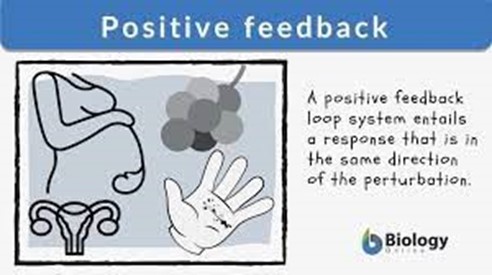Positive feedback mechanisms:
Usually produce stable conditions.
Cause long-term changes.
Move conditions away from the normal state.
Bring conditions back to the normal state.
The Correct Answer is C
Positive feedback mechanisms move conditions away from the normal state.

They amplify the original action and produce more of the same effect.
For example, blood clotting and childbirth are positive feedback mechanisms.
Choice A is wrong because positive feedback mechanisms usually produce unstable conditions.
They do not resist change but rather enhance it.
Choice B is wrong because positive feedback mechanisms do not cause long-term changes.
They are ultimately stopped by negative feedback loops once the process they were used for is complete.
Choice D is wrong because positive feedback mechanisms do not bring conditions back to the normal state.
That is the role of negative feedback mechanisms, which oppose the stimulus and restore homeostasis.
Nursing Test Bank
Naxlex Comprehensive Predictor Exams
Related Questions
Correct Answer is D
Explanation
The pulmonary circuit sends oxygen-poor blood to the lungs, where it is oxygenated and returned to the heart.
This is distinguished from the systemic circuit, which sends oxygen-rich blood to the tissues and returns oxygen-poor blood to the heart.
Choice A is wrong because it confuses the pulmonary circuit with the systemic circuit. The pulmonary circuit does not send blood to the tissues but to the lungs.
Choice B is wrong because it only describes part of the pulmonary circuit.
The pulmonary circuit sends oxygen-poor blood to the heart, but only after it has been oxygenated in the lungs.
Choice C is wrong because it confuses the pulmonary circuit with the systemic circuit. The pulmonary circuit does not bring blood from the tissues but from the heart.
Correct Answer is B
Explanation
This means that the electrical activity that causes the atria to contract starts from the sinoatrial node and spreads across the atria.
The P wave on the ECG reflects this atrial depolarization.
Choice A is wrong because repolarization of atrial muscle fibers is not visible on the ECG, as it occurs during the QRS complex when the ventricular depolarization masks it.
Choice C is wrong because the depolarization of ventricular muscle fibers is represented by the QRS complex on the ECG, not the P wave.
Choice D is wrong because the repolarization of ventricular muscle fibers is represented by the T wave on the ECG, not the P wave.
Normal ranges for the P wave are:
Duration: less than 0.12 seconds (less than 3 small squares)
Amplitude: less than 2.5 mm (0.25 mV) in the limb leads, less than 1.5 mm (0.15 mV) in the precordial leads
Axis: between 0° and +75°12
Whether you are a student looking to ace your exams or a practicing nurse seeking to enhance your expertise , our nursing education contents will empower you with the confidence and competence to make a difference in the lives of patients and become a respected leader in the healthcare field.
Visit Naxlex, invest in your future and unlock endless possibilities with our unparalleled nursing education contents today
Report Wrong Answer on the Current Question
Do you disagree with the answer? If yes, what is your expected answer? Explain.
Kindly be descriptive with the issue you are facing.
